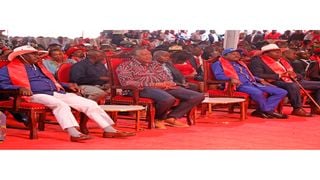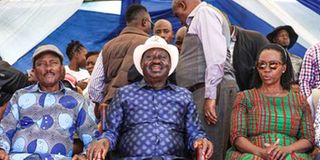
From left: Opposition chief Raila Odinga, Jubilee Party leader and former President Uhuru Kenyatta, Wiper Party leader Kalonzo Musyoka, and Democratic Action Party-Kenya boss Eugene Wamalwa during the Jubilee Party NDC at the Ngong Racecourse on May 22, 2023.
| Lucy Wanjiru | Nation Media GroupWeekly Review
Premium
Finance Bill or 2027 strategy? Why Raila, Azimio is at a crossroads
The one-week ultimatum issued by Opposition leader Raila Odinga to President William Ruto on May 27 to reverse what he termed tribal state appointments, lest the Azimio la Umoja-One Kenya coalition party calls for secession from the rest of Kenya, elapses tomorrow.
And even before the President and his Kenya Kwanza Alliance administration fulfil this particular demand, there are several other ultimatums on the card.
The very latest one was issued by the former Prime Minister on the eve of Madaraka Day, which was marked last Thursday, demanding that Dr Ruto withdraw “the punitive Financial Bill” latest by June 5 or face unspecified action from the opposition.
Only a week ago, following a parliamentary group meeting, Azimio similarly released a statement with a raft of demands from their Kenya Kwanza counterparts, including withdrawal from the Joint Bipartisan Talks.
They gave Kenya Kwanza an ultimatum to comply.
Deputy President Rigathi Gachagua has also been asked to withdraw his government shareholding remarks, otherwise, the opposition would ask its supporters to stop channelling taxes to the Ruto administration and possibly form a parallel government.
While some of the conditions were quickly met – including the withdrawal of Eldas MP Adan Keynan from the Joint Bipartisan Talks to avert the collapse of the dialogue and the threat of resumption of mass action – Azimio’s string of ultimatums seems to expose the opposition’s apparent limitation of options.
But deputy Senate Minority Leader Enoch Wambua maintains that Azimio’s demands are purposeful. He explains, for instance, that they suspended the street protests as a demonstration of goodwill after the Ruto administration’s request to give the bipartisan talks a chance.
“But I can’t guarantee that the suspension will hold for long because that decision is conditioned on the behaviour of the Kenya Kwanza leadership,” he added.

Azimio leader Raila Odinga addresses journalists at Jaramogi Oginga Odinga Foundation in Nairobi on May 16, 2023.
Describing the Financial Bill, for instance, as “a decree of mass destruction for millions of Kenyans and businesses”, Wambua observes that the Bill has taken on a life of its own: “If the Kenya Kwanza administration pushes this Bill through Parliament on the strength of its purchased tyranny of numbers, that could well be the beginning of the end for this administration. Save my comment in a stable bank and thank me later”.
On the Independent Electoral and Boundaries Commission (IEBC), the second-term Senator, who is also a member of the Joint Bipartisan Talks, explains that Azimio is firm that the recruitment panel for IEBC commissioners cannot produce a truly neutral outcome.
Azimio members at the talks have accordingly drafted an alternative approach and are waiting for Kenya
Kwanza negotiators to bring their proposals to the table.
Either way, the ultimatum ping-pong presents a big dilemma for the opposition side. Political analyst Mark Bichachi likens Azimio to an individual with a hangover, still recovering from a state of drunkenness and asking – like Kenyan musician, Mejja – “jana kulienda aje (what happened yesterday)?”
Political reality
Bichachi attributes Azimio’s rage and seeming lack of focus to its failure to appreciate the political reality of the moment. The Azimio leadership and its supporters, he argues, are still bamboozled at how victory in last year’s presidential elections slipped through their fingers by a paltry 200,000 votes, when they were best placed to clinch the top prize.
Besides enjoying the support of incumbent President Uhuru Kenyatta, as well as financial muscle, Azimio boasted a galaxy of political heavyweights from across the country, including former Vice-President Kalonzo Musyoka, Narc-Kenya and Kanu party leaders Martha Karua and Gideon Moi respectively, former governors Kiraitu Murungi (Meru), Wycliffe Oparanya (Kakamega) and Hassan Joho (Mombasa) and former Cabinet Secretaries Peter Munya and Eugene Wamalwa.

Azimio leaders Kalonzo Musyoka, Raila Odinga and Martha Karua at Kamukunji Grounds in Nairobi on December 7, 2022.
And now Azimio’s situation is further complicated by disillusioned voters who rejected Odinga and his running-mate, Karua, at the ballot, but are now warming up to the coalition: “Azimio is surprised that the electoral lover who dumped him is now regretting that the hustler has not delivered. And even as Azimio continues to nurse the emotional pain of losing this lover, the lady is now seeking to be saved from this abusive marriage, which unfortunately can only be dissolved after five years,” Bichachi allegorically captures the scenario.
This turn of events can indeed be very confusing for Azimio. Bichachi opines that, as it embraces those who rejected it on the ballot, the opposition needs to sober up, get rid of its anger over the last presidential poll and plot ahead of the 2027 elections. His views resonate with those of individuals within Azimio who believe the opposition outfit needs to spend more time, resources and energy strategising for the next elections instead of whining about Ruto’s legitimacy as the fifth President.
Wiper Party leader Musyoka, who has supported Odinga’s presidential bid three times, and twice as running-mate, is among the Azimio bigwigs who subscribe to this school of thought. Besides criticising the government and keeping President Ruto in check, a task that the Azimio brigade has executed exceptionally, the former VP believes the opposition should focus on Ruto’s ouster.
Speaking at his Yatta home in Machakos County mid-last month, when he hosted political leaders from the wider Ukambani region as well as Azimio’s top leadership, Musyoka stressed the need to “move with speed” to consolidate Azimio’s secretariat “and be able to see whether going forward, we will give Azimio number one priority”.
The revamping of the coalition’s secretariat and the positioning of the outfit to unseat Ruto are key for the former VP. For the Wiper Party fraternity, ‘revamping of the secretariat’ is a synonym for early identification of Azimio’s flag bearer. Still, this pointed focus is a rather discomforting area for some within the coalition.
Political friction
Although there are indications that he may not seek the top seat this time round, politicians allied to Odinga are not particularly enthusiastic about this approach. They fear that such a discourse will open up the coalition to unnecessary political friction and jostling, resulting in cracks within. National Assembly Minority Leader Opiyo Wandayi told The Weekly Review that the priority at the moment is to fight for the interests of the ordinary citizen against the excesses of Ruto’s Kenya Kwanza administration.

A section of Azimio leaders during a press briefing at Jaramogi Oginga Odinga Foundation in Nairobi on June 5, 2023.
This, he points out, includes the current push to have the Financial Bill withdrawn. The Bill, which has attracted a lot of public interest, proposes, among other things, the introduction of a housing levy and increased taxation on a number of services and products.
While at it, pundits think the opposition has failed to onboard other players who are opposed to the Bill’s enactment as law such as Reuben Kigame, a presidential hopeful in the last elections, and a host of non-politician players. Instead, Odinga and company have made the anti-government campaign a closed-door affair, fashioned as a single coalition party with Odinga, Karua and Musyoka as senior partners.
Its apparent failure to harness political support across the country, coupled with the push for the reinstatement of commissioners of the electoral body, otherwise referred to as the Cherera Four, are among factors that portray Azimio as an outfit of “mixed focus”. It is a situation that former Nairobi Governor, Evans Kidero, who has since defected from Azimio to Kenya Kwanza, describes as “deep fishing”, implying that the Odinga-led outfit may be getting its priorities wrong.
Azimio’s challenges notwithstanding, the very fact that they continue piling pressure on the government is agreeable to many. Amidst the high cost of living and increased taxation, the presence of a strong voice that checks the excesses of government is a welcome intervention. Vocal politician Kabando wa Kabando, for instance, believes that what Raila is advocating is for the good of all Kenyans and “can put Kenya on a new political threshold”.
However, according to the former Mukurweini MP, the push by the Azimio brigade will only benefit Kenyans if Raila focuses not on his personal travails, “but on the broader agenda for the welfare of deceived, disenchanted and desperate hustlers”. Kabando’s position is informed by the general tendency of politicians to cloud otherwise noble missions geared towards benefitting the masses with narrow and personal political agendas.
Curiously, President Ruto claims to know what the possible endgame scenarios of Azimio’s anti-governmental protests might be. Speaking in Njabini, Nyandarua County, during the burial on May 13 of freedom fighter Dedan Kimathi’s widow, Mukami Kimathi, Ruto said that he understands Odinga’s political manoeuvres only too well.
The former Premier concurred with the President, stating that because of their long-term association in politics, he understood Ruto “more than any other politician in this country”. He maintained, therefore, that he knew exactly what he was doing. How the current political impasse pans out might seem clear to the two protagonists – Ruto and Raila. For now, however, Azimio’s endgame remains rather hazy.





